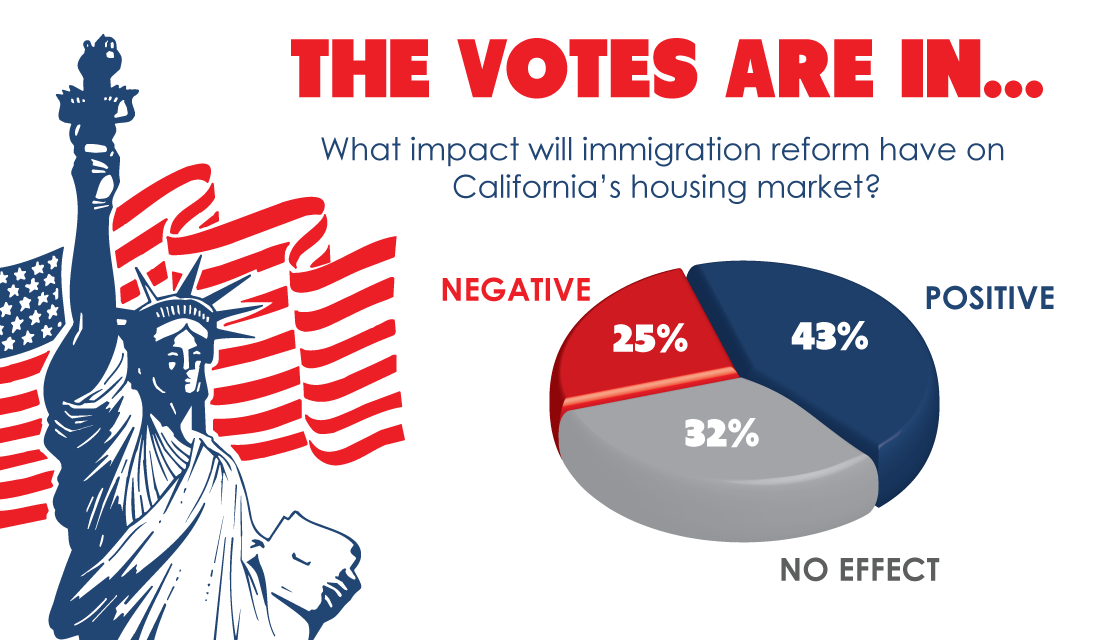Our readers are ready for immigration reform. According to a recent poll, 43% of our readers believe reforming immigration policy will have a positive effect on California’s housing market, while only 25% said it will have a negative effect. 32% voted immigration reform will not impact the market at all.
Readers’ perspectives on the issue have oscillated over the past few years. In 2013, results were similar to recent opinions: 49% of our voters said immigration reform would positively impact the market, while only 33% said it would have a negative effect. However, opinions shifted dramatically in 2015 when 56% voted immigration reform would negatively affect the market and 36% believed it would have a positive effect.
Immigration has sparked much debate in California, but the influx of migrants has also increased housing demand, influencing the direction of the real estate market — a trend our readers are catching on to.
Immigration reform in California
The Golden State has a long history of immigration, as its population and economy have always been heavily influenced by immigrants.
Ongoing immigration trends often spur outrage from residents who fear undocumented immigrants damage the economy and seize employment opportunities otherwise available to existing citizens — a belief that has resulted in anti-immigration laws like Proposition 187 in 1994.
However, despite the xenophobic response from some, California has moved forward with progressive immigration reform, providing undocumented immigrants a better quality of life than other states.
California law now permits immigrants with an Individual Tax Identification Number (ITIN) to:
- obtain driver licenses and work permits;
- attend colleges with in-state tuition; and
- purchase homes and apply forITIN mortgages (though lending standards are higher).
Further, undocumented immigrants were recently afforded the opportunity to become licensed real estate agents, as the California Bureau of Real Estate (CalBRE) now issues licenses regardless of immigration or citizenship status.
California is continuing a spate of immigration-friendly legislation and policies that seek to incorporate immigrants into our economy. By expanding rights to immigrants, the state is allowing all residents and immigrants to contribute to the state’s economy — an advantage many xenophobic states are not able to obtain with harsh anti-immigration laws.
A positive outlook for the market
A major benefit to progressive immigration reform in California is the resulting boost to the homeownership rate. Creating pathways to citizenship increases the likelihood of homeownership among currently undocumented immigrants, resulting in an increase in residential construction the state is severely in need of.
The potential for growth becomes clearer when taking into account the fact that undocumented immigrant workers hold a higher number of jobs in the construction industry, according to the Public Policy Center of California.
Further, immigrants who become U.S. citizens are likely to contribute substantial amounts in real estate costs, ultimately leading to increased consumer spending that significantly benefits the economy — if progressive immigration reform allows for it.
Both the National Association of Hispanic Real Estate Professionals (NAHREP) and the Bipartisan Policy Center also note immigration reform offers broader benefits to the economy, including:
- reducing the cumulative federal deficit by $570 billion;
- expanding the U.S. labor force by 8.4 million without taking away from average worker wages;
- increasing economic growth by 4.8%; and
- increasing gross domestic product (GDP) by 0.5%.
Conversely, suppressing immigration reform or promoting anti-immigration laws stifles immigrant access to legal employment and citizenship, resulting in:
- an increase in the federal deficit by $100 billion; and
- a reduction of GDP by 1.5%.
For the housing market, immigration reform ultimately translates into more real estate transactions and construction. Real estate professionals privy to the benefits of California immigration may use this as an opportunity to grow their business and the local economy — a prospect our readers may be well-aware of in light of their recent votes.
Related articles:



















Do you know the definition of “xenophobia”? I don’t think so. It means “… having or showing a dislike of or prejudice against people from other countries.”. California’s 187 was in no way xenophobic. The law was intended to deny services to ILLEGAL’s not LEGAL immigrants.
If you are going to use words that with a very specific meaning, please use it with that specificity.